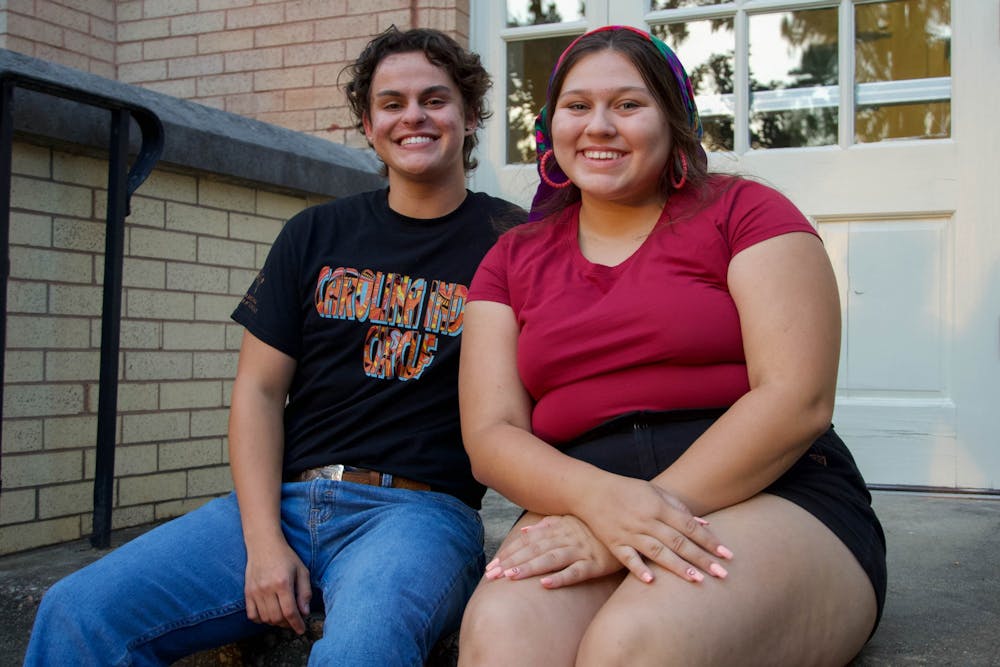“It’s been such a great experience of having other Native students on campus who understand what it’s like to be a native student at a predominantly white institution,” Hunt-Briggs said.
Briggs, a senior double majoring in American-Indian and Indigenous Studies and Psychology, in addition to a minor in Education, plans to attend the Masters of Teaching Program at UNC and go on to work in special education for K-12.
Lydia-Ruth Mansfield – Historian
From Pembroke, NC, Mansfield grew up attending Native American culture classes, where she learned beadwork, pottery and dance. Pembroke, the Lumbee tribe’s headquarters, had an extremely tight-knit community, she said.
In high school, Mansfield served as the North Carolina Native American Youth Organization representative at tribal events, Powwows and other gatherings.
Coming to UNC and switching from her predominantly Native American hometown to a predominantly white community “was a shellshock,” she said. Although she is a first-year, Mansfield knew she would join CIC, as both her mother and father were previous presidents of the organization at the University.
“I felt like I was really disconnected from my culture, from my people, and I really wanted to be able to find a family away from home.” she said.
Being around other Native Americans, Mansfield said she did not feel the pressure to code-switch. Her favorite aspect of CIC is bringing cultural awareness to the UNC community.
Zoey Locklear – Banquet Chair
From Clinton, NC, Locklear grew up in a small Native community. She said she always knew she wanted to be a part of CIC, as her mother was a part of it in her time at the University. As a child, Locklear attended CIC Powwows.
Locklear, a first-year student, was nervous about finding safe spaces on campus and fitting in, but amongst CIC members, she found that network.
“[I] know that if I ever need any help or just need a support system or just someone to talk to, I have people there that can relate to me,” she said.
To get the day's news and headlines in your inbox each morning, sign up for our email newsletters.
Locklear enjoys the outreach portion of CIC. Through the organization, she said she has learned about “the beauty and diversity of my people.” Locklear has met Native people from across the country and has learned about their shared cultures and differences. For example, she said there are different ways to tie knots in tobacco bundles, and each tribe has its own stories and significance behind the knots.
“There’s a feeling that Native people can feel that is hard to say through language – you can just feel the spirit come over you,” she said.
Mason Locklear – Powwow Co-Chair
Locklear is from Robeson County, NC, where the Native population is the largest ethnic group. From youth, Locklear said he knew who he was, and everybody around him knew that he was Native American. Before coming to UNC, he knew he wanted to be a part of CIC, calling it a “safe haven.”
However, things changed when he got to college. He said he is now mistaken for other ethnicities, and people ask him questions about his identity. Once, Locklear said someone told him he must have been awarded a scholarship because he was Native American.
On the other hand, Locklear said it makes him happy when people want to learn more about Native culture and ask him questions to help them understand.
“They ask why we’re not federally recognized,” he said. “It’s my time to shine light on my tribe and to tell our story.”
Locklear said CIC is a space where he can be with other people who think the same and feel the same about different aspects of life and connect with each other on a cultural level.
“Being at home just gives you that peace of mind,” he said. “You don’t have to make sure everyone understands who you are.”
university@dailytarheel.com | elevate@dailytarheel.com



